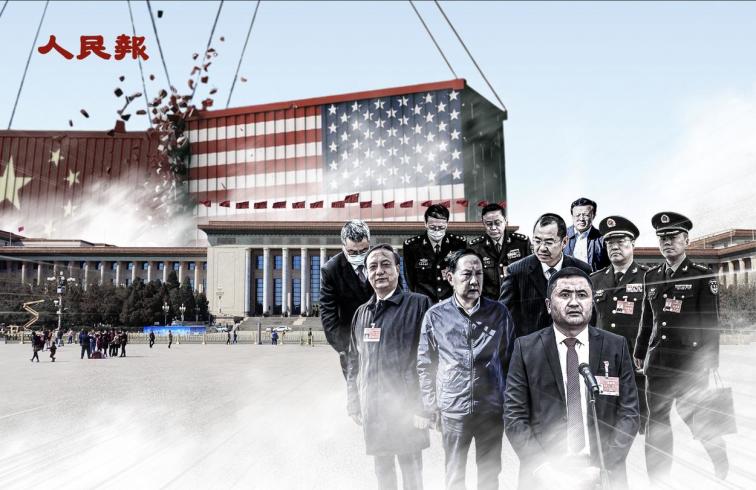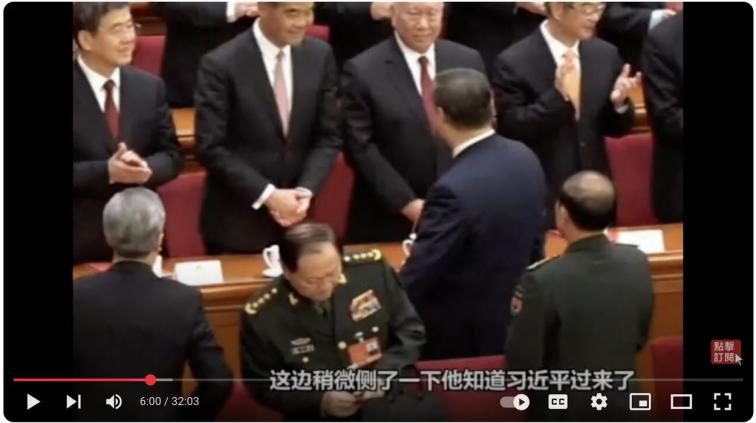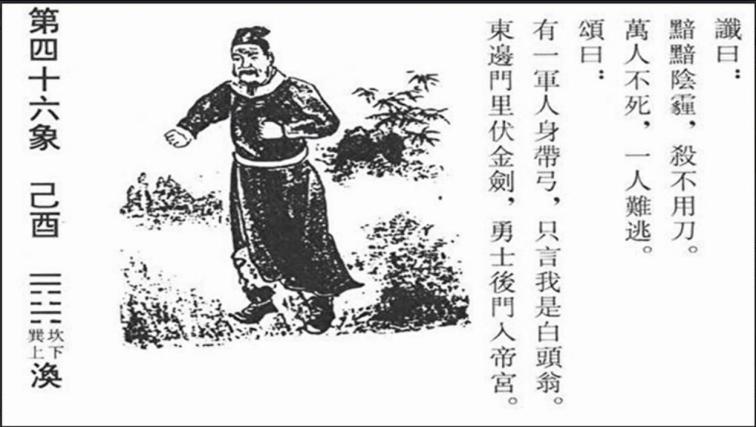Zhang Youxia counterstrikes against Xi Jinping (People News illustration)
[People News] The Fourth Plenary Session of the 20th Central Committee of the Communist Party of China concluded on the afternoon of October 23. The communiqué from the meeting indicates that the Military Commission has only added Zhang Shengmin as vice chairman, and the rumours regarding Xi Jinping's resignation as chairman of the Military Commission did not come to fruition. Currently, the Military Commission consists of only four members. Li Shangfu, the Minister of National Defence promoted by Xi Jinping, did not ascend to the position of Military Commission member. Some analysts suggest that the anti-Xi faction, represented by Zhang Youxia, and Xi Jinping have reached a stalemate in this round of political manoeuvring, but the dynamics of their confrontation and fierce battles are unlikely to change. Others argue that there is no force within the military capable of countering Xi Jinping, and the only factor that could alter the political landscape is Xi Jinping's health.
On Thursday (October 23), the official Xinhua News Agency reported that 67-year-old Zhang Shengmin has been promoted to vice chairman of the Central Military Commission. The communiqué announced the replacement of 11 candidates for the Central Committee, including Yu Huiwen, Ma Hancheng, Wang Jian, Wang Xi, Wang Yonghong, Wang Tingkai, Wang Xinwei, Wei Tao, Deng Yiwu, Deng Xiuming, and Lu Hong. This marks the largest personnel change within the Communist Party since 2017.
The replacement of alternate committee members notably skipped over several key figures, including Wang Liyan, deputy commander of the Rocket Force; Wang Kangping, commander of the Joint Logistics Support Force; Wang Jiayi, deputy minister of the Ministry of Education; Fang Yongxiang, director of the Military Commission Office; Fang Hongwei, secretary of the Xi'an Municipal Committee; Shi Yugang, deputy secretary of the Party Group of the Yunnan Provincial Political Consultative Conference; and Shi Zhenglu, commander of the Northern Theater Army.
During the 18th and 19th National Congresses, there were instances of replacement and leapfrogging, with those skipped not necessarily facing investigation. However, this time, the number of leapfrogging replacements is the largest recorded. Most analysts believe that being skipped does not automatically imply a purge, but the current situation still appears unusual. While civilian officials may not be implicated, military officials could potentially be under investigation.
Following the adjustments made by the Fourth Plenary Session, Xi Jinping remains the Chairman of the Central Military Commission of the Communist Party of China, with Zhang Youxia continuing as Vice Chairman. Zhang Shengmin has been promoted to Vice Chairman of the Military Commission, and the only other member is Liu Zhenli, the Chief of Staff of the Joint Staff Department.
Zhang Shengmin serves as the Secretary of the Central Military Commission's Discipline Inspection Commission and the Director of the Supervisory Commission, overseeing military anti-corruption initiatives. He has now ascended to the position of second-ranking Vice Chairman of the Central Military Commission, succeeding He Weidong, the former Vice Chairman who was expelled from the Party and military last week.
At 67 years old, Zhang Shengmin hails from the Rocket Force (formerly the Second Artillery) and has a background as a political officer. He previously held the position of Director of the Political Research Office of the General Political Department of the People's Liberation Army, later serving as the Political Commissar of the Second Artillery Command Academy and the Director of the Political Department of the Second Artillery. In 2015, he returned to Beijing to become the first Political Commissar of the Training Management Department of the Central Military Commission and has held various roles, including Political Commissar of the Logistics Support Department, since 2017.
Notably, on November 2, 2017, the Communist Party held its first promotion ceremony since the formation of the new Central Military Commission during Xi Jinping's new term at the 19th National Congress. The only general promoted during this ceremony was Zhang Shengmin, who was interpreted at the time as an extraordinary and exceptional elevation by Xi Jinping.
The Second Artillery, now known as the Rocket Force, along with the Logistics Support Department, are both primary targets of Xi Jinping's military anti-corruption campaign, yet Zhang Shengmin has remained unaffected.
Additionally, on May 16 of this year, Zhang Shengmin (张昇民) represented the military at the seventh National Self-Strengthening Model and Advanced Recognition Conference for the Disabled, organised by the Communist Party of China. A report from Hong Kong media noted that matters concerning disabled individuals in the military are typically managed by the political work department. This suggests that Zhang Shengmin has succeeded Miao Hua (苗华) as the head of this department, and it is even possible that he may also hold the position of director.
The report further explained that the political work department functions similarly to the Organisation Department and the Propaganda Department of the Central Military Commission. It is primarily responsible for guiding the propaganda, ideological, and cultural initiatives of the People's Liberation Army, as well as overseeing organisational development, including the evaluation of senior generals. The significant power held by this department is clear.
What effects and changes will Zhang Shengmin's elevation to Vice Chairman of the Military Commission bring to the power dynamics within the Military Commission?
Political commentator Chen Pokuang analysed in his program that Zhang Shengmin's appointment as vice chairman of the Military Commission is the outcome of a power struggle between Zhang Youxia and Xi Jinping. The Central Military Commission of the Communist Party originally had 7 members, but with He Weidong, Miao Hua, and Li Shangfu having already been ousted, only 4 members remain, and the committee has not yet been fully staffed. Liu Zhenli and Zhang Youxia form a strong alliance, while Dong Jun has not been included in the Military Commission. In this contest, Zhang Youxia and Xi Jinping appear to be at a stalemate.
Chen Pokuang noted that he had previously suggested that if Liu Zhenli were promoted to vice chairman of the Military Commission, it would indicate a favourable position for Zhang Youxia. Conversely, if Zhang Shengmin were to be promoted, it would signify a balance between Zhang Youxia and Xi Jinping.
Despite both being from Shaanxi and Zhang Shengmin being a general promoted by Xi Jinping, Chen Pokuang believes that prior to the Third Plenary Session, Zhang Shengmin relied on Xi Jinping. However, after the session, he may shift his allegiance to Zhang Youxia.
Chen analysed that Zhang Shengmin, who was formerly the political commissar of the Rocket Force, could not remain unaffected given the downfall of all Rocket Force generals. In this precarious situation, he chose to align himself with Zhang Youxia. As the secretary of the Military Discipline Commission, Zhang Shengmin played a crucial role in the ousting of He Weidong and Miao Hua, announcing these developments ahead of the Fourth Plenary Session. Without Zhang Shengmin's support, it would have been challenging for Zhang Youxia to achieve this.
Chen Pokuang believes that Liu Zhenli and Zhang Youxia are a strong alliance, which explains Xi Jinping's reluctance to promote Liu Zhenli to vice chairman of the Military Commission, leading to the selection of Zhang Shengmin instead. Meanwhile, the current Minister of Defence, Dong Jun, who was promoted by Xi Jinping and favoured by Peng Liyuan, still did not gain entry into the Military Commission after the Fourth Plenary Session, and he is not even a State Councilor. This situation may not only reflect opposition from Zhang Youxia and others but could also suggest that Dong Jun's political prospects are uncertain and potentially at risk.
Chen Pokuang summarised that following the Fourth Plenary Session, the Central Military Commission (CMC) of the Communist Party of China (CPC) continues to display three unusual abnormalities, which can be likened to a collapse. Firstly, the CMC is not fully staffed; it originally had 7 members, but after the Fourth Plenary Session, it still only has 4, meaning these 4 must handle the responsibilities of 7. Secondly, the Vice Chairman of the CMC, Zhang Shengmin, is not a member of the Politburo, which is an unprecedented situation. Thirdly, the Minister of National Defence, Dong Jun, remains neither a member of the CMC nor a State Councillor, which is also quite rare.
Chen Pokuang pointed out that this situation does not indicate that Xi Jinping has emerged victorious.
Independent scholar Wu Zuolai shares a similar perspective with Chen Pokuang. In his self-media program, he noted that Xi Jinping did not win this time, while Zhang Youxia has achieved a minor gain.
He analysed that after the Fourth Plenary Session, the situation would enter a phase of strategic stalemate, where all factions within the CPC must collectively confront a significant economic crisis. Everyone is apprehensive about the potential for disaster, and the elders will not support the military in attempting to overthrow Xi's central leadership. If Xi Jinping had compelled Zhang Youxia to resign during this Fourth Plenary Session, it would have represented a decisive victory. However, it is evident that he lacks the strength to do so.
He believes that, conversely, Zhang Youxia has made some progress; Zhang Shengmin's collaboration with him in anti-corruption efforts targets Xi's trusted aides, which has led to his promotion to Vice Chairman of the CMC, forcing Xi Jinping to make concessions. The military even made an exception by announcing the outcomes of the handling of 9 generals prior to the Fourth Plenary Session, thereby pressuring Xi's central leadership to acquiesce. In contrast to the handling of Xu Caihou in the past, which Xi Jinping personally oversaw and passed in a meeting, he is now clearly reluctant to witness a large-scale purge of his own allies. Ultimately, what Xi Jinping has secured is a transitional period of maintaining positions, retreating, and waiting for another 2 years. This timeframe may also serve as a window for him to seek re-election.
The account 'Xiaoxiaosheng' has also shared similar opinions: the current deadlock, with neither side willing to make concessions, is a reality following the Fourth Plenary Session; there are no clear winners or losers, and interpretations vary widely. What cannot be denied is that the struggle continues and is intensifying. The 'Li Keqiang phenomenon' has emerged after the 20th National Congress; will a similar situation arise after the Fourth Plenary Session? Will Li Keqiang be succeeded by Zhang Youxia, Xi Jinping, or someone else? It is normal for a 68-year-old to pass away, so it is also normal for someone in their 70s to die.
As for Zhang Shengmin not being included in the Politburo, some suggest that Xi Jinping is concerned about the military commission's potential political influence within the Politburo and is therefore obstructing his entry. However, there have been similar precedents in the Communist Party, where individuals were first promoted to vice-chairman of the military commission before joining the Politburo.
Independent commentator Cai Shenkun has consistently expressed scepticism and disagreement regarding rumours that Xi Jinping may be forced to resign. He noted that, like many others, he hopes Xi Jinping will soon relinquish power. However, there is currently no visible force within the Communist Party to counterbalance Xi Jinping, whether within the party or the military, and the international environment does not exert pressure on authoritarian centralised governance. As for how long Xi Jinping will continue his solo act, that depends on his health. Once he ages, those around him will likely be unable to hold back from revealing their true intentions and initiating a new round of infighting. Only then might there be a significant turning point for China.'
Observers believe that while Zhang Shengmin has been promoted to vice chairman of the Central Military Commission (CMC) of the Communist Party of China, there have been no new appointments within the CMC. The internal power dynamics largely remain unchanged since before the Fourth Plenary Session, with Zhang Youxia, Zhang Shengmin, and Liu Zhenli continuing to share leadership responsibilities. Xi Jinping appears to be losing military influence and is somewhat isolated. During this Fourth Plenary Session, Zhang Youxia did not remove Xi Jinping from his position as CMC chairman, but Xi Jinping was also unable to diminish Zhang Youxia's military power. In comparison to He Weidong and Miao Hua, Liu Zhenli seems to have a closer relationship with Zhang Youxia, while Zhang Shengmin may be neutral, though current analysis indicates he is more aligned with Zhang Youxia. In the near term, it will be challenging for Xi Jinping to re-establish a new faction within the military. Thus, in the ongoing military power struggle, it can be said that Zhang Youxia has a slight advantage.
△











News magazine bootstrap themes!
I like this themes, fast loading and look profesional
Thank you Carlos!
You're welcome!
Please support me with give positive rating!
Yes Sure!